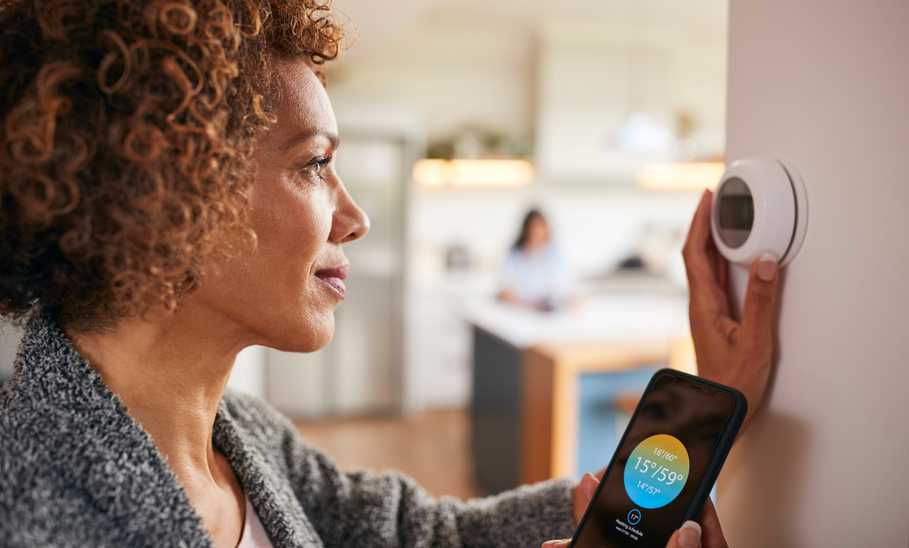- Compatible with: Google Assistant, Amazon Alexa, iOS, Android
- Dimensions: 0.86 inches deep x 5.7 inches long x 3.2 inches wide
- Self-install: Yes
- Warranty: No
- Price on publish: $48.99
Best Smart Thermostats for Keeping Your Home Comfortable

Our evaluations and opinions are not influenced by our advertising relationships, but we may earn a commission from our partners’ links. This content is created by TIME Stamped, under TIME’s direction and produced in accordance with TIME’s editorial guidelines and overseen by TIME’s editorial staff. Learn more about it.
When shopping for the best smart thermostat for your home, it’s important to find a thermostat that works for your HVAC system, and also offers the right combination of features needed for easy and effective use. I asked heating and cooling experts about how to choose the right smart thermostat, including which features are most important and what you need to know about installing smart thermostats. Based on their advice, here are my top picks for the best smart thermostats you might want to consider for your home.
![[object Object] [object Object]](https://m.media-amazon.com/images/I/41zaXZ65A9L._SL500_.jpg)
The Degrii Smart Thermostat may be affordably priced but isn’t short on features. You can create a customized schedule using the app, and a geofencing feature detects when you’re between one and five miles away and adjusts the temperature. The Degrii app also monitors your energy usage and makes recommendations to reduce wasted energy. According to Degrii, the thermostat is compatible with 95% of HVAC systems, but you should use the compatibility checker to make sure it works with your system before buying it.
![[object Object] [object Object]](https://images.ctfassets.net/a3qyhfznts9y/64in7B602n9IQGFZTlTAYj/e64a6d4b5ecc33ee5a97adbe53a1afd3/e3lite-pdp-overview-CAN_2x.jpg?w=1080&h=1080&q=80&fm=webp)
This smart thermostat is equipped with numerous features for effective temperature regulation. Its Smart Recovery feature learns how long it takes to reach the desired temperature, so it can start adjusting it before you get out of bed. Connect it to SmartSensors to better control temperatures in multiple zones. This thermostat is compatible not only with systems like Alexa and Google Assistant, but also with less common platforms like Samsung Smart Things and If This Then That.
![[object Object] [object Object]](https://m.media-amazon.com/images/I/21LC4rJLKNL._SL500_.jpg)
By pairing this smart thermostat with the three included room sensors, it can regulate temperature in multiple rooms. The room sensors have a signal range of up to 200 feet, so this setup can work well for even larger homes. The sensors are also equipped with motion detection that can recognize if you’re just passing through or spending time in a room, adjusting the temperature accordingly.
![[object Object] [object Object]](https://images.ctfassets.net/a3qyhfznts9y/2X1B1YoVnr0jj6qBWg3UeN/083196c076d2c2e65421da89103ac2c4/Transforming_the_thermostat.jpg?w=1080&h=1080&q=80&fm=webp)
For overall easy operation, this thermostat is equipped with advanced temperature management features. The Smart Recovery feature learns how long it takes to cool or heat your home to your desired temperature, and starts the process before you wake up so your home is comfortable. The thermostat also regulates indoor humidity to prevent frost from building up on windows, and if your home has a ventilator, it uses outside air to cool down your home instead of an air conditioner. Plus, this thermostat functions as a base station for Ecobee Smart Security, and can even display your doorbell’s video feed.
This smart thermostat brings your home to an ideal temperature before you wake up, monitors your air quality, includes a SmartSensor to monitor temperatures in different rooms, and more.
![[object Object] [object Object]](https://images.thdstatic.com/productImages/a3089d26-e4a0-45b3-85bd-201f6728af9d/svn/metallic-honeywell-home-programmable-thermostats-rth9585wf-64_1000.jpg)
This thermostat offers plenty of customization options: You can pair it with Google Assistant, Amazon Alexa, or Microsoft Cortana for easy voice operation. You can also personalize the full-color display to match your home’s colors. The thermostat learns your temperature preferences for convenient use, and also pairs with a smartphone app so you can operate it no matter where you are.
![[object Object] [object Object]](https://m.media-amazon.com/images/I/412CZXNxwRL._SL500_.jpg)
The Ecobee4 Smart Thermostat comes with a smart sensor for remote monitoring. The sensor not only monitors temperatures within a room, it can also recognize if the room is occupied and adjust the temperature accordingly. Alexa comes built into this thermostat, so you can control it using a smartphone or device, by voice, or by using the large touchscreen.
![[object Object] [object Object]](https://images.thdstatic.com/productImages/e46c5004-0479-4165-9dc7-83aea52f7a4e/svn/stainless-steel-google-programmable-thermostats-t3007es-64_1000.jpg)
The Google Nest Learning Thermostat has a sleek and modern design, and since it’s available in seven colors, you can choose the option that works best with your home decor. This thermostat learns your schedule and automatically adjusts the temperature so you’re comfortable without wasting energy. It will also automatically adjust itself to Eco Temperature when you’re out of your home, saving energy.
![[object Object] [object Object]](https://shop.meross.com/cdn/shop/files/26.png?v=1688349800&width=650)
The affordably priced Meross Smart Thermostat is one of the few thermostats designed for use with electric baseboard and in-wall heaters. If it detects an open window, the thermostat automatically stops heating your home to save energy. It features a sleek white design that will complement many home aesthetics, and provides both real-time usage consumption data and usage reports so you can identify ways to save more energy.
![[object Object] [object Object]](https://images.thdstatic.com/productImages/8da7df3a-222e-4de5-b8dc-012d9e691939/svn/white-emerson-programmable-thermostats-st55-64_600.jpg)
This smart thermostat easily pairs with Amazon Alexa, as well as other popular platforms. Since it’s designed to fit the space as a traditional thermostat, you don’t have to worry about patching and painting your wall after installation. It provides equipment alerts and maintenance reminders to help you keep your HVAC system working at its best, while usage reports help you identify ways to save more energy.
![[object Object] [object Object]](https://images.thdstatic.com/productImages/72d0bf29-32b8-497f-8514-507a3f4cb9e0/svn/black-emerson-programmable-thermostats-st75-64_600.jpg)
The Emerson Sensi Touch smart thermostat features a large color display that’s easy to read, and it’s available in three finish colors so you can choose the option that matches your home. It pairs with Apple HomeKit, and the thermostat provides usage reports, equipment alerts, and maintenance reports to help you stay on top of your energy usage and maintenance needs.
![[object Object] [object Object]](https://images.thdstatic.com/productImages/4db74da9-cba8-423e-b04e-4697c56538a2/svn/black-programmable-thermostats-rth8800wf2022-64_1000.jpg)
Measuring just over four by four inches in size, this smart thermostat features a large touchscreen that’s easy to see and use. It includes several helpful features, including the ability to schedule your temperature programming for seven days at a time. The geofence technology also allows for location-based temperature control, so the thermostat can adjust your home’s temperatures based on whether you’re home or away.
Al Fagundes, founder and CEO of A. Fagundes Plumbing & Heating, Inc., explains that before looking at any other features, buyers need to make sure that a smart thermostat is compatible with their existing heating and cooling system. “A smart thermostat that’s not compatible with your HVAC system won’t work,” he says.
Fagundes notes that a thermostat should include a variety of programming options that allow you to customize it to your lifestyle. “This way, you can set it to turn off when you’re not at home or when you’re asleep, which will help save energy and reduce your utility bills.”
Look for features like a climate-zoning system, which can help avoid wasting energy on unused zones in your home, and auto scheduling functions, which can detect when you’re home or away and adjust the temperature accordingly.
Consider how the thermostat operates, too. “A good thermostat is controllable from your phone or laptop, allowing you to adjust the temperature remotely,” Fagundes says. “The device should also be user-friendly and easy to navigate, even for people who aren’t tech-savvy.”
Smart thermostats’ real value is in their ability to help reduce energy consumption and save money. Fagundes suggests that buyers look for devices that are certified by EnergyStar or another respected certification organization. Additionally, choose a thermostat that provides detailed reports on energy usage. Those reports can help you to identify ways to adjust your settings to further save energy.
“A solid warranty is another good indicator of a quality product,” Fagundes advises. “Look for a smart thermostat with a warranty of at least two years, or longer, if possible.”
While a smart thermostat can help to save money, it’s important that it fits within your budget. As you shop, compare thermostat prices and features to ensure that you’re getting maximum value for your purchase.
Matthew Ferris, master plumber, HVAC expert, and founder of Ferris Plumbing, explains that smart thermostats have multiple benefits. “Smart thermostats can really help homeowners save on their energy bills,” he says. “By learning users’ temperature preferences and schedules, they optimize heating and cooling to be as efficient as possible. The remote control is also handy for folks who travel a lot. Integrating with other home devices provides convenience, too.”
Fagundes highlights the fact that smart thermostats also encourage energy-friendly habits and provide recommendations on when to adjust the temperature. As the Smart Energy Consumer Collaborative reports, independent study data indicates smart thermostats can save customers an average of 10 to 12% on their heating and 15% on their cooling costs. When basing these percentages on average energy costs, customers can save approximately $140 per year on their energy bills when using a smart thermostat.
Smart thermostats also give you valuable remote access to your home. You can easily adjust temperatures to avoid unnecessary energy usage while you’re away from home, including when you’re at work or on vacation.
“Additionally, smart thermostats provide you with essential information exactly when you need it,” says Fagundes. “They can alert you if the temperature strays above or below the preset range, indicating a potential issue.” You’ll also receive alerts for power outages and maintenance needs, such as changing the air filter in your air conditioning and heating system.
“[Smart thermostats] work particularly well for energy-conscious households, new owners familiarizing themselves with a new home, and people with big homes and temperature needs in different areas,” says Ferris. “Frequent travelers will love the remote access, too.”
Fagundes explains that families with children may also benefit from smart thermostats. “Children tend to be more susceptible to temperature fluctuations and may require a specific temperature for comfort,” he says. “The same goes for older adults or individuals with health concerns. Maintaining a consistent and healthy temperature in the home can be essential for those with respiratory or cardiovascular issues.”
Smart thermostats allow you to easily set and maintain a specific temperature or set a schedule that adjusts temperatures throughout the day to keep the home at the ideal temperature.
Ferris says homeowners can usually install a smart thermostat themselves as long as they’re comfortable working with the electrical components. “That said, I always recommend having a professional do it,” he says. “We’re trained to handle things safely and properly. The last thing anyone wants is a wiring mistake that could damage the HVAC system.”
In selecting the best thermostats, I looked for products that offered numerous features and programming options, including auto scheduling and climate zoning capabilities. I looked for thermostats and apps that are easy to use, and also considered whether the thermostat requires a professional installation.
Additionally, I tried to select thermostats that are Energy Star certified, or certified by another reputable company. I looked for products backed by warranties, as well as products that provide data to help you see what you’re saving and adjust your programming for additional savings.
According to Sealed, smart thermostats feature a common wire that plugs into your HVAC system. The thermostat control senses the temperature in your rooms and communicates with the HVAC to maintain an ideal temperature. Smart thermostats use WiFi to communicate with an app, allowing you to also control the device remotely.
You’ll need to consider your lifestyle when deciding if it’s worth investing in a smart thermostat. If you spend lots of time away from home, smart thermostats can allow you to significantly reduce your energy usage and save money when you’re not home. If you’re always home or have pets at home and don’t want your home’s temperature to fluctuate much, you’ll save less energy and money with a smart thermostat.
Ferris notes that he’s had great experiences with Nest thermostats. “They have intuitive interfaces and strong app support,” he says. Fagundes recommends the Ecobee Smart Thermostat Premium, which has numerous settings to fine-tune the climate, and which includes a built-in Alexa smart speaker.
Fagundes explains that if your WiFi goes down, most thermostats will send you a phone notification that they’ve lost the WiFi connection. You won’t be able to use any remote control features on your smartphone app, and will have to physically change the temperature on the thermostat until the WiFi is functional again.
A room sensor can help a smart thermostat to accurately monitor a room’s temperature when the thermostat is located in another room. Whether you need room sensors depends on your home’s layout and the thermostat’s location.
The information presented here is created by TIME Stamped and overseen by TIME editorial staff. To learn more, see our About Us page.



